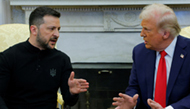President Clinton, Please Don’t Go To North Korea
▶ By Joseph C. S. Yi
When I lived in Korea, from 1930 to 1940, Korea was under Japanese rule. Their control was so complete that, for the first ten years of my life, I never saw a Korean flag.
Then, in 1940, upon arrival in America, I saw the Korean flag for the first time in my life. Maybe because I was young, maybe because I was impressionable, I felt tremendous excitement and pride at the sight of my flag and all that it stood for. I still carry that wonderful feeling.
That feeling, however, did not last very long because of the cruelty and the uncertainty of world events. At the end of World War II, Korea was divided - by our allies.
For the first time, since being divided up, Korea has a chance for reunification. I will go to great lengths to deter those who would divert from this effort; thus this article.
* * *
In the Chicago Tribune there appeared an article, on October 11, 2000, that noted that President William Clinton had met with the No. 2 official of North Korea, the First Vice Chairman of North Korea’s National Defense Commission Jo, Myong-rok, and discussed ways to ease tension between the two Koreas.
In the same newspaper, on October 12, 2000, Secretary of State Madeleine Albright disclosed that she would visit PyongYang soon to meet with the North Korean Leader Kim, Jong-il, stating that she looks forward to discussing serious issues and matters of national concern.
First Vice Chairman Jo, after meeting with President Clinton and Secretary Albright said that, "Leader Kim has made the decision to remove confrontation and distrust from our bilateral relationship."
Are we to believe this rhetoric? Are we that gullible? And yes, he did say bilateral; BILATERAL RELATIONSHIP between the United States and North Korea.
President Clinton conveniently has forgotten that, in 1999, with his former Secretary of Defense Dr. William Perry serving as our senior official, conducted an independent study of our inchoate North Korea Policy.
The Perry Report, issued on October 12, 1999, stated flatly that "(1) no U. S. policy can succeed unless it is coordinated with Republic of Korea policy, and (2) the United States’ policy must deal with North Korea as it is, not as we might wish it to be."
In either of the two articles, relative to the exchange of visits, there were no mentions of any coordination, by the United States, with the Republic of Korea. If there were contacts with South Korea, why doesn’t the Clinton administration just say so? Do they think that consulting with an ally is a sign of weakness? Are they so insecure that they want people to think that they alone run the show? No wonder our foreign policy, and our relationship with the rest of the world, is in such shambles.
In the October 23, 2000 issues of the Chicago Sun-Times, it was reported that Secretary Albright landed in PyongYang, North Korea. It was also reported that the Secretary presented a letter to Leader Kim in regard to further development in bilateral relations between the United States and North Korea.
Her mission, in addition to assessing North Korea’s sincerity and true intentions of its outreaches to America, is to prepare the way for a Clinton visit, perhaps as early as next month.
At the conclusion of her trip, Secretary Albright stated that, on her way back to America, she would stop by in Seoul to brief the South Korean and the Japanese officials on her meetings with North Korea. Briefing South Korea, as an afterthought, is not my idea of coordination between partners.
Georgie Anne Geyer, a syndicated columnist based in Washington, D. C., recently wrote that "The United States is giving away the shop and getting nothing in return; it’s another of the Clinton administration’s witless legacy exercises."
For years, without success, the Clinton administration has been trying to bring North Korea out of its isolation. It is only because of initiatives by the South Korean President Kim, Dae-jung that a break through is now possible. And now, at this crucial juncture, President Clinton wants to go at it alone.
What is troublesome is that, since the talks between the United States and North Korea started, the North has not been attending meetings it was supposed to attend with the South to further their earlier plans for the unification of the two Koreas. Ms. Geyer goes on to say, "This is the pattern: whenever the U. S. supplants the South, North Korea diverts its attention from having to deal with the South and focuses on getting its bigger prize."
Don’t President Clinton and Secretary Albright understand that this unilateral relationship, between the United States and North Korea, weakens South Korea’s hand in dealing with North Korea, thereby crippling the best chance we have had in a long time to defuse the half century old turmoil? Do they even care?
An article in the Sun-Times, dated October 24, 2000, reminds us that President Clinton’s Camp David summit is followed by continuing violent clashes between Israelis and Palestinians, and that Clinton’s Irish peace process is looking distinctly shaky. "In short, both peace processes, sponsored by Clinton, are foundering almost simultaneously."
Having observed President Clinton these past 8 years, his maneuverings have become obvious. He sets up enormous expectations, takes the credit, and when failures and frustrations set in, he blames others and somehow escapes accountability.
We can "forgive President Clinton’s ignorance; after all, what does he know about world affairs? But Secretary Albright, because of her education and her personal past, should know better and should be held accountable if she were to recommend that President Clinton visits North Korea.
It seems to me that President Clinton, desperately in need to show something positive in his conduct of our country’s foreign policy, wants to meet the North Koreans, while ignoring his own policy to coordinate with South Korea matters that are of utmost importance to Korea, Asia and all the free world.
What I am most concerned about is that, in his vexatious attempts at self-aggrandization, President Clinton may undo what many people, including the decades of efforts by the Nobel Peace Award winner South Korean President Kim, Dae-jung, have strived for so valiantly and for so long, thereby derailing another opportunity for world-wide peace.
All things considered, President Clinton, please, don’t go to North Korea.
Joseph Yi came to America in 1940, at the age of 10, and has lived basically in the Chicago Metropolitan Area. Although Mr. Yi’s professional life was in the mainstream society, he has actively participated in the voluntary social services for the Chicago Korean community.
스마터리빙
more [ 건강]
[ 건강]이제 혈관 건강도 챙기자!
[현대해운]우리 눈에 보이지 않기 때문에 혈관 건강을 챙기는 것은 결코 쉽지 않은데요. 여러분은 혈관 건강을 유지하기 위해 어떤 노력을 하시나요?
 [ 건강]
[ 건강]내 몸이 건강해지는 과일궁합
 [ 라이프]
[ 라이프]벌레야 물럿거라! 천연 해충제 만들기
 [ 건강]
[ 건강]혈압 낮추는데 좋은 식품
[현대해운]혈관 건강은 주로 노화가 진행되면서 지켜야 할 문제라고 인식되어 왔습니다. 최근 생활 패턴과 식생활의 변화로 혈관의 노화 진행이 빨라지고
사람·사람들
more많이 본 기사
- 180일간 김건희만 판 특검 오늘 수사 종료…’V0’ 단죄 성과
- 뉴욕에 3년만에 최대 폭설…항공기 수천편 결항·지연
- ‘파친코’ 이민진 작가 “맘다니 뉴욕시장, 긍정적 변화 기대”
- “트럼프, 29일 네타냐후 회담서 가자휴전 이행문제 제기키로”
- ‘AI 조작 번복’ 폭로자 vs ‘유재석 패싱’ 이이경..하차 잔혹사로 번진 사생활 논란 [2025 연말결산]
- 이이경·조세호 다 떠나고..유재석 곁엔 결국 ‘무도’ 인연이었다
- “개인 선정은 SON이 유일?” 손흥민, 축구계 8대 기적 선정이 더 대단한 이유 “퀴라소 월드컵 진출보다 멋져”
- 여야, ‘통일교·종합 특검’ 정면충돌 예고…연말연시 대치정국
- ‘6·3 大戰’ 앞둔 대통령실 참모들 시선집중…10여명 출마 거론
- ‘이강달’ 강태오, 로코 달인은 다르다.. “김세정도 눈빛 좋다고”
- 젤렌스키 미국행… “레드라인 있지만 타협점 찾을 수 있어”
- 태국-캄보디아, ‘101명 사망’ 교전 20일만에 휴전
- 황하나, 남편 사망→캄보디아서 남친과 출산..귀국 후 구속 ‘파란만장’
- 캐나다, 우크라에 2조원대 추가 재정 지원키로
- 쿠팡 김범석, 30~31일(한국시간) 연석청문회 또 불출석 의사… “일정 있어”
- ‘통일교 자금관리’ 한학자 前비서실장 재소환…피의자 전환
- NASA 신임 국장 “美, 트럼프 임기내 달에 다시 갈것”
- IS 확실했나…트럼프 ‘성탄절 나이지리아 폭격’ 갸우뚱
- 마지막 토요일도 도심 집회… “내란 … 1
- 오윤아 “子, 학교 떨어져 잘못 키웠나..방치 했나 싶어 눈물”
- “아동 수출국 오명 벗는다” 70년 만에 해외입양 중단
- 새해 맞아 백만 달러 상금 증정 이벤트와 다양한 설 행사 선보여
- [이지 사이언스] “온난화 막으려면 세계인구 44% 식단 바꿔야…문제는 소고기”
- 보수 야당 “의원직 사퇴하고 법심판 받아야”…김병기에 총공세
- 새로운 콘포밍 론 한도
- 국힘 “신천지로 통일교 특검 물타기 안돼”…與 “성역없이 규명”
- 뉴욕시 폭설에 항공기 수천편 취소·지연 사태
- 트럼프 “소말릴란드 아는 사람 있나?”…이스라엘 승인에 ‘NO’
- 올해 美 기업 파산신청 증가… “관세·고물가·고금리 원인”
- 황하나, 마약 도피 중 캄보디아서 출… 1
- LA 등 서부에 사흘째 폭우…동부엔 폭설 예보
- “출생시민권은 사기”⋯ 이민 2세대 공격 초점 맞춘 트럼프
- “올해 최고 주목받은 테크 거물은 머스크 아닌 래리 엘리슨”
- 우크라이나 포로수용소의 북한군인 동무들에게
- 물류거점창고에 불체자 8만명 수용 추진
- 16세로 성장한 버클리 문학, 성대한 송년 파티
- 쿠팡 ‘정부 반박’ 영문성명 미묘한 표현차… ‘잘못된 비난’ 부각
- “엔비디아, AI칩 스타트업 인수 아닌 기술 계약으로 규제 회피”
- 소싯적 ‘치기어린’ 주소 “굿바이”…지메일 주소변경기능 도입
- 8시즌 뛰고 ML 역대 17위 “오타니 GOAT 될 것”, ML 역대 50인 선정
- ‘손흥민 감격의 첫 우승’ 올해 축구계 기적 톱8 선정 ‘선수로는 유일’
- 국제은값 폭등에 개인투자자들 銀투자 대거 유입
- VA·MD 7명 생굴 먹고 식중독…22개주 60여명 감염
- 뉴욕·뉴저지 연말 대대적 음주운전 단속
- ‘학자금 상환’ 안하면 임금압류
- “솔직히 자신은 없죠” 3루수 GG 송성문, 유격수도 아닌 외야라니... 생존 본능 발동할까
- 특검, 尹에 징역 10년 구형… “법치주의·사법질서 파괴”
- 미국, 美방산기업 제재한 中에 “대만 무기판매 보복 강력반대”
- ICE 버지니아 구금시설 ‘포화’…수감자 역대최고
- 특검, ‘로저비비에’ 김기현 부부 기소…尹 뇌물 수사는 경찰로
1/5지식톡

-
 미 육군 사관학교 West Poin…
0
미 육군 사관학교 West Poin…
0https://youtu.be/SxD8cEhNV6Q연락처:wpkapca@gmail.comJohn Choi: 714-716-6414West Point 합격증을 받으셨나요?미 육군사관학교 West Point 학부모 모…
-
 ☝️해외에서도 가능한 한국어 선생님…
0
☝️해외에서도 가능한 한국어 선생님…
0이 영상 하나면 충분합니다!♥️상담신청문의♥️☝️ 문의 폭주로 '선착순 상담'만 진행합니다.☎️ : 02-6213-9094✨카카오톡ID : @GOODEDU77 (@골뱅이 꼭 붙여주셔야합니다…
-
 테슬라 자동차 시트커버 장착
0
테슬라 자동차 시트커버 장착
0테슬라 시트커버, 사놓고 아직 못 씌우셨죠?장착이 생각보다 쉽지 않습니다.20년 경력 전문가에게 맡기세요 — 깔끔하고 딱 맞게 장착해드립니다!장착비용:앞좌석: $40뒷좌석: $60앞·뒷좌석 …
-
 식당용 부탄가스
0
식당용 부탄가스
0식당용 부탄가스 홀세일 합니다 로스앤젤레스 다운타운 픽업 가능 안녕 하세요?강아지 & 고양이 모든 애완동물 / 반려동물 식품 & 모든 애완동물/반려동물 관련 제품들 전문적으로 홀세일/취급하는 회사 입니다 100% …
-
 ACSL 국제 컴퓨터 과학 대회, …
0
ACSL 국제 컴퓨터 과학 대회, …
0웹사이트 : www.eduspot.co.kr 카카오톡 상담하기 : https://pf.kakao.com/_BEQWxb블로그 : https://blog.naver.com/eduspotmain안녕하세요, 에듀스팟입니다…
케이타운 1번가
오피니언

새해 더 중요해지는 노동법 준수

연말연시, 안전하고 차분하게
 캐슬린 파커 워싱턴포스트 칼럼니스트
캐슬린 파커 워싱턴포스트 칼럼니스트 [캐슬린 파커 칼럼] 지미 라이의 마지막 희망
 유경재 나성북부교회 담임목사
유경재 나성북부교회 담임목사 [한국춘추] 미국의 힘
 전병두 서북미수필가협회 회원
전병두 서북미수필가협회 회원 [금요단상] 비자 발급
 박일근 / 한국일보 수석논설위원
박일근 / 한국일보 수석논설위원 [지평선] 스님의 주례사
 신상철 / 고려대 고고미술사학과 교수
신상철 / 고려대 고고미술사학과 교수 [미술 다시보기] 신의 모습을 닮고자 한 예술가
 스티브 강 전 한인민주당협회 회장
스티브 강 전 한인민주당협회 회장 [스티브 강 ‘인사이드 미국’] 2026 중간선거: 트럼프 지지율 하락이 말해주는 것
 김홍일 케이유니콘인베스트먼트 대표
김홍일 케이유니콘인베스트먼트 대표 [기고] 안정의 기준은 어떻게 제도가 되었나
1/3지사별 뉴스

물류거점창고에 불체자 8만명 수용 추진
도널드 트럼프 행정부가 이민자 구금·추방을 효율화하기 위해 전국 물류거점 창고에 8만명 규모의 수용시설 확보를 추진한다고 24일 워싱턴 포스트…
‘학자금 상환’ 안하면 임금압류

“온 세상에 희망·평화의 빛 스며들길”
가자지구와 우크라이나에서의 전쟁, 고립과 불평등으로 세상이 어지러운 가운데 워싱턴 지역 각급 한인교회와 성당들이 성탄절을 맞아 일제히 예배와 …
“연말은 스트레스·새해 결심은 없다”

“올해 최고 주목받은 테크 거물은 머스크 아닌 래리 엘리슨”
올해 미국에서 가장 주목받은 기술업계 거물은 일론 머스크 테슬라 최고경영자(CEO)가 아닌 래리 엘리슨 오라클 창업자·회장이라고 블룸버그 통신…
[새해부터 이렇게 달라진다] 최저임금 또 오르고… 유급 병가는 더 확대

오늘 하루 이 창 열지 않음 닫기 





















































.png)


댓글 안에 당신의 성숙함도 담아 주세요.
'오늘의 한마디'는 기사에 대하여 자신의 생각을 말하고 남의 생각을 들으며 서로 다양한 의견을 나누는 공간입니다. 그러나 간혹 불건전한 내용을 올리시는 분들이 계셔서 건전한 인터넷문화 정착을 위해 아래와 같은 운영원칙을 적용합니다.
자체 모니터링을 통해 아래에 해당하는 내용이 포함된 댓글이 발견되면 예고없이 삭제 조치를 하겠습니다.
불건전한 댓글을 올리거나, 이름에 비속어 및 상대방의 불쾌감을 주는 단어를 사용, 유명인 또는 특정 일반인을 사칭하는 경우 이용에 대한 차단 제재를 받을 수 있습니다. 차단될 경우, 일주일간 댓글을 달수 없게 됩니다.
명예훼손, 개인정보 유출, 욕설 등 법률에 위반되는 댓글은 관계 법령에 의거 민형사상 처벌을 받을 수 있으니 이용에 주의를 부탁드립니다.
Close
x